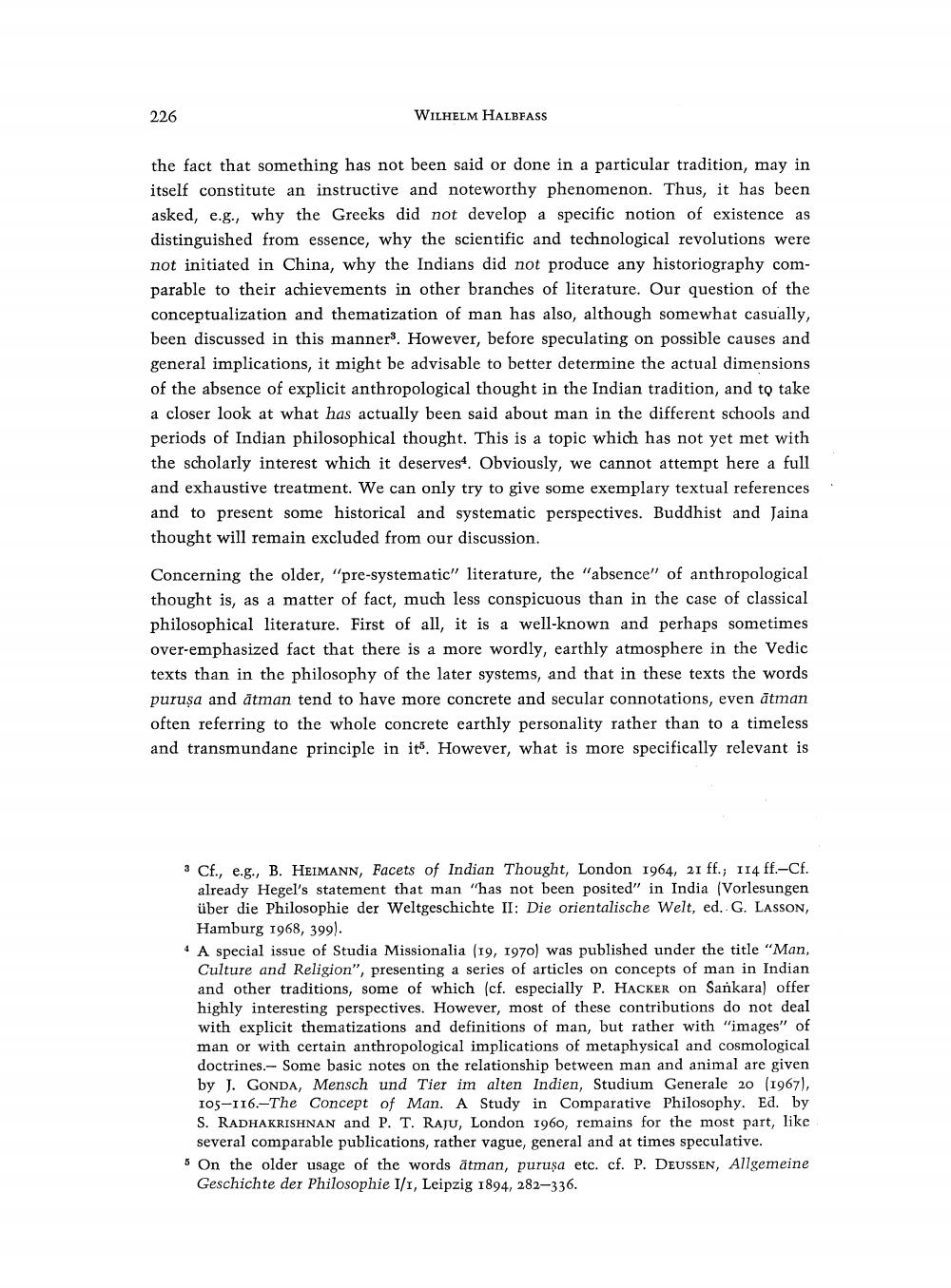Book Title: Anthropological Problems In Classical Indian Philosophy Author(s): Wilhelm Halbfass Publisher: Wilhelm Halbfass View full book textPage 2
________________ 226 WILHELM HALBFASS the fact that something has not been said or done in a particular tradition, may in itself constitute an instructive and noteworthy phenomenon. Thus, it has been asked, e.g., why the Greeks did not develop a specific notion of existence as distinguished from essence, why the scientific and technological revolutions were not initiated in China, why the Indians did not produce any historiography comparable to their achievements in other branches of literature. Our question of the conceptualization and thematization of man has also, although somewhat casually, been discussed in this manner. However, before speculating on possible causes and general implications, it might be advisable to better determine the actual dimensions of the absence of explicit anthropological thought in the Indian tradition, and to take a closer look at what has actually been said about man in the different schools and periods of Indian philosophical thought. This is a topic which has not yet met with the scholarly interest which it deserves4. Obviously, we cannot attempt here a full and exhaustive treatment. We can only try to give some exemplary textual references and to present some historical and systematic perspectives. Buddhist and Jaina thought will remain excluded from our discussion. . Concerning the older, "pre-systematic" literature, the "absence of anthropological thought is, as a matter of fact, much less conspicuous than in the case of classical philosophical literature. First of all, it is a well-known and perhaps sometimes over-emphasized fact that there is a more wordly, earthly atmosphere in the Vedic texts than in the philosophy of the later systems, and that in these texts the words puruşa and ātman tend to have more concrete and secular connotations, even ātman often referring to the whole concrete earthly personality rather than to a timeless and transmundane principle in it. However, what is more specifically relevant is 3 Cf., e.g., B. HEIMANN, Facets of Indian Thought, London 1964, 21 ff.; 114 ff.-Cf. already Hegel's statement that man "has not been posited" in India (Vorlesungen über die Philosophie der Weltgeschichte II: Die orientalische Welt, ed. G. LASSON, Hamburg 1968, 399). 4 A special issue of Studia Missionalia (19, 1970) was published under the title “Man, Culture and Religion", presenting a series of articles on concepts of man in Indian and other traditions, some of which (cf. especially P. HACKER on Sankara) offer highly interesting perspectives. However, most of these contributions do not deal with explicit thematizations and definitions of man, but rather with "images" of man or with certain anthropological implications of metaphysical and cosmological doctrines.- Some basic notes on the relationship between man and animal are given by J. GONDA, Mensch und Tier im alten Indien, Studium Generale 20 (1967), 105-116.-The Concept of Man. A Study in Comparative Philosophy. Ed. by S. RADHAKRISHNAN and P. T. RAJU, London 1960, remains for the most part, like several comparable publications, rather vague, general and at times speculative. 5 On the older usage of the words ātman, puruşa etc. cf. P. DEUSSEN, Allgemeine Geschichte der Philosophie I/1, Leipzig 1894, 282-336.Page Navigation
1 2 3 4 5 6 7 8 9 10 11 12
